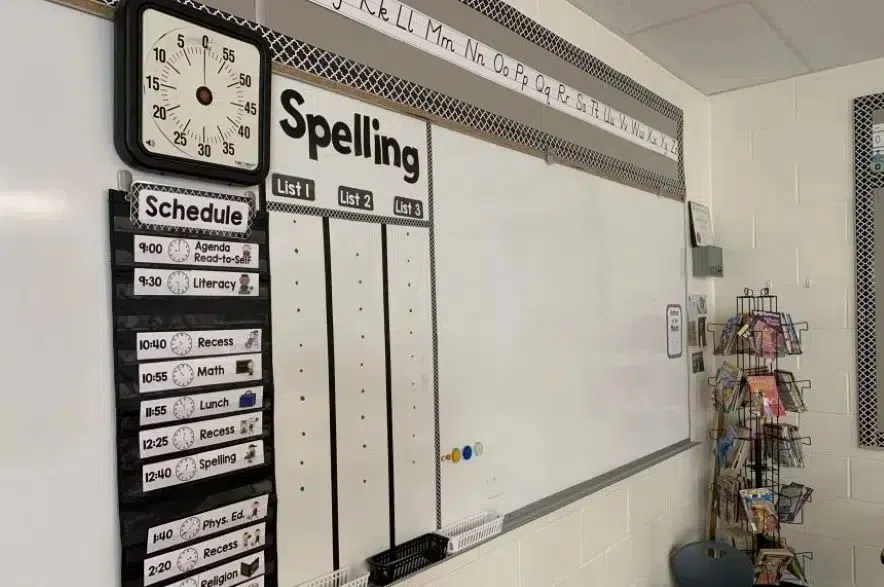Throughout its negotiations with the provincial government, the Saskatchewan Teachers’ Federation has maintained class size and complexity should be included in any collective bargaining agreement.
On Friday, the Saskatchewan School Boards Association weighed in on the topic — and sided with the government.
SSBA president Jaimie Smith-Windsor said the best place to address those issues is locally at the school board level, with a solution that reflects the diversity in the province’s divisions.
“So what we’ve really proposed here is a community-by-community solution that is not a one-size-fits-all approach because our classrooms come in various diverse forms and we just are looking for local tables to find local solutions to address class complexity and unique needs of each school division,” said Smith-Windsor.
She explained that 80 per cent of funding school boards get goes to salary and benefits, with another 15 per cent going into operations. That leaves only five per cent for flexibility.
“A one-size-fits-all approach does not lend itself to the kind of flexibility for local response to diverse classrooms and uniqueness of our province,” she said.
Classroom complexity — the number of students who require additional support — and class size have been a sticking point in negotiations, along with teacher compensation.
Talks between the union and the government broke down Tuesday night, prompting the union to reinstate sanctions. On Friday, those included one-day rotating strikes and the provincewide withdrawal of lunch-hour supervision.
STF president Samantha Becotte said earlier this week that the union will continue to press for those items to be part of whatever agreement the union can reach with the government.
“We’re hopeful (there will be) a commitment around improvements in our classrooms where class complexity can be addressed,” she said.
However, Becotte also said recent statements made by Education Minister Jeremy Cockrill suggested the Government-Trustee Bargaining Committee doesn’t have the mandate to discuss those issues, so the union won’t return to the bargaining table.
“When the GTBC has a new mandate and is prepared to discuss all of the issues, including class size and complexity, we are ready to return (to negotiations) day or night,” Becotte said.
The government has offered an agreement to annualize the funding already announced to deal with classroom size and complexity — $40 million to school divisions to deal with operating pressures, $6.1 million for the Teacher Innovation and Support Program pilot and the Specialized Support Classroom pilot, and $7 million to hire more educational assistants.
However, that deal would be outside the teachers’ collective bargaining agreement, and Becotte said that means there wouldn’t be any dispute resolution if the province didn’t hold up its end of the agreement and it could be cancelled by the government at any time.
Smith-Windsor said the SSBA is proposing a solution to the problem, building on that $53.1-million commitment from the government. She said there should be local committees created with local teachers’ associations, board trustees and senior administration to identify and address problems with class size and complexity.
She also suggested a fund be established for local boards to actually address the problems, to be funded by the provincial government.
And Smith-Windsor said there should be a reporting framework established as part of the Provincial Education Plan.
She said this is a mechanism to work collaboratively at the local level and meet the needs of local communities, calling it hopeful work.
“What we are proposing is a mechanism that involves teachers, boards, local divisions and communities to get together and be proactive in addressing complexity on a community-by-community basis,” said Smith-Windsor.
The SSBA president said they all believe complexity needs to be addressed, and she believes this plan can get the two sides moving forward in contract talks in a good way.
Trustee speaks out
Derek Hassen, a trustee for Holy Trinity Catholic School Division, wrote in a Facebook post at the end of January that he agreed with the government that local boards are best suited to determine the needs of their school in regards to class composition and complexity.
However, he said boards lack the resources to provide supports for classroom composition and complexity.
“The Sask. School Boards Association has made it clear that we need stable and predictable funding and that we need to invest in the operations of our schools,” Hassen said.
“As a reminder, school boards no longer control their funding through taxation. The Ministry controls it all. Decisions such as this and the current environment where decisions are being made by the Ministry of Education with no meaningful consultation with those tasked to implement changes is one that I find troubling. We all benefit when education is well funded, and we must change course in how we view education in Saskatchewan.”
Hassen wrote that education “is in trouble” due to funding issues.
“During my seven years as a trustee I see the same pattern repeating. Each budget cycle, we find ‘efficiencies,’ restructure, or cut. I have yet to experience a budget where we have had the opportunity to add supports without it coming at a cost to some other programming,” Hassen wrote.
Hassen said a budget that allows school divisions to maintain the status quo would be a welcome relief, but it is unfortunate that there is so much more the boards could be doing.
“I remember the days of having an Ed Psych on staff, Instructional Coaches, Behaviour Consultant, Multiple Speech and Language Pathologists with Speech Assistants in each school, and Teacher Librarians. We did not lose these positions because of lack of need,” Hassen said.
“The challenges within a classroom are unlike any I have seen in my 25+ years involved in education. We are blessed to welcome newcomers to our wonderful communities, but we lack the resources to support those that speak no or limited English. We also lack the supports to effectively work with children who face a myriad of challenges whether they be learning or behavioural.”
Hassen said education is no longer being viewed as an investment, which he said was “short-sighted at best and incredibly problematic long-term.”
— With files from 980 CJME’s Lisa Schick and Daniel Reech











